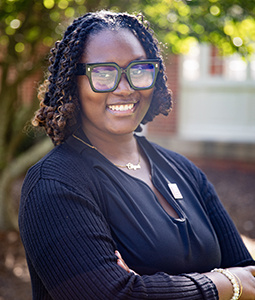Brain Health
- SC.edu
- About
- Brain Health
- Faculty and Staff
- Aliyah Little BA
Faculty and Staff
Aliyah Little, MA, MHA
| Title: | Certified Community Health Worker |
| Brain Health | |
| Email: | aliyah.little@uscmed.sc.edu |

Biography
Aliyah Little is a USC Brain Health Certified Community Health Worker.
As a Certified Community Health Worker, Little is a liaison between providers, patients and surrounding communities. She assists in planning and implementing community-based classes, education sessions, presentations, health fairs and more.
Little has worked as an administrative assistant with the Department of Health and Human Services - Healthy Connections and as a behavioral health associate with Waypoint Recovery Center.
Little attended the High School for Health Professions in Orangeburg, SC where she also completed a mental health therapy internship.
She holds a Bachelor of Art in psychology, which she earned from Claflin University, and is working toward completion of two master's degrees: a Master of Art in marriage and family therapy through National University, and a Master's in Healthcare Administration from Louisiana State University Shreveport.
LIttle is Mental Health First Aid certified. The certification teaches the skills needed to recognize and respond to signs and symptoms of mental health and substance use challenges, as well as how to provide someone with initial support until they are connected with appropriate professional help. Little learned risk factors and warning signs for mental health and addiction concerns, strategies to help someone in both crisis and non-crisis situations, and where to turn for help.
Additionally, she is a Registered Behavioral Technician. In this capacity, Little can work with children and adults with autism spectrum disorder. Behavioral technicials are trained to use a science-based therapy (applied behavior analysis) to help people with autism build skills in communication, socialization, self-help and play.
Little is proud to serve on the USC Brain Health team, be an advocate for and liaison to patients and caregivers, and have a true impact in South Carolina communities.